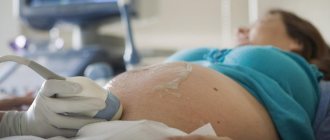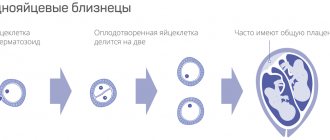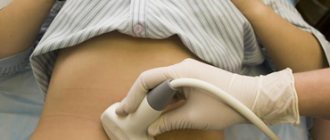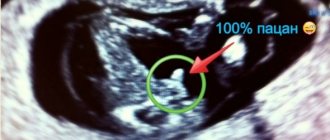Clinic » Services » Pregnancy management » Pregnancy progress by week
Pregnancy is a very special state for a woman. The expectant mother must not only register in a timely manner and be observed by a specialist, but also devote a lot of time to self-education. It doesn't matter what week you are pregnant right now. In any case, the guidance we offer will be useful and will help you better understand your own condition. With our help, you can find out what changes occur in the fetus from the first to the fortieth week, how the child develops, what happens to his weight, the formation of body parts, and growth. We have tried to provide a detailed description of the course of pregnancy week by week.
Our guide to pregnancy will become your assistant and will help you find out what exactly happens to the body in the first weeks, and what changes await you in the future. We described the features of a woman’s well-being during this important period and the specifics of fetal development.
Find out the cost of a consultation and make an appointment with a doctor by phone:
+7 or
Make an appointment
1-4 weeks
The egg grows and matures in the ovary before conception. Ovulation is the movement of a mature egg from the ovary into the fallopian tube. Ovulation occurs in the middle of the cycle. When a mature egg and sperm unite, fertilization occurs, and from this moment the development of the future baby begins.
At week 4, the size of the embryo is only 2-4 mm. As a rule, a woman does not feel anything and often does not even realize that pregnancy is occurring.
You can read more about the first weeks of fetal development here.
What does ultrasound screening show?
Ultrasound scanning is a highly informative, non-invasive and safe way to obtain data on the health of the expectant mother and fetus. The method is based on the analysis of differences in the reflection of ultrasonic waves from structures of unequal density.
The purpose of an ultrasound examination is to assess the condition of a woman and her unborn child, as well as to identify possible deviations from the norm in order to take the necessary measures (ultrasound for fetal pathology).
Ultrasound diagnostics allows you to confirm the fact of pregnancy, obtain data on the formation of the fetus, the structure of the uterus and appendages, as well as the condition of the placenta, umbilical cord, and amniotic fluid. The results of ultrasound largely determine the tactics of pregnancy management and preparation for childbirth, as well as the choice of method of delivery.
After confirming the fact of pregnancy, all subsequent ultrasounds are performed according to the schedule drawn up by the attending gynecologist.
The following reasons may be the reason for an unscheduled ultrasound in early pregnancy:
- discrepancy between the size of the uterus and the norm for the current stage of pregnancy;
- the woman has bleeding (single or frequent);
- pain and discomfort in the lower abdomen;
- suspicion of a “frozen” pregnancy, ectopic pregnancy and other pathologies of early pregnancy;
- the age of one or both future parents exceeding 35 years.
1 fetal ultrasound
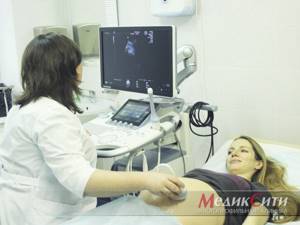
2 fetal ultrasound
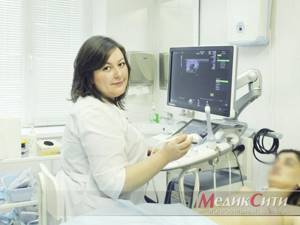
3 Fetal ultrasound
5-8 weeks
The embryo grows, almost a million new cells are formed every minute. By the end of the seventh week, it will already reach one centimeter in length. By the end of the eighth week, the unborn baby will grow to 1.5-2 cm. At this time, primitive nerve pathways begin to form in his brain. During an ultrasound examination with CRT (coccygeal-parietal size) more than four centimeters, the specialist will be able to determine the heartbeat.
You can read more about the features of weeks 5-8 here.
Tests and ultrasound
There is still a long way to go before pregnancy registration. However, if you are planning to conceive, then you should undergo simple research before doing so. This will help to diagnose possible complications in a timely manner and minimize risks during pregnancy.
One of the most important tests is a test for sexually transmitted infections. Many of them are asymptomatic, but significantly affect the ability to conceive and the development of the fetus in the future. To understand whether the body is ready for the 9-month test, you also need to pass:
- general blood and urine tests;
- gynecological smear;
- test for blood group and Rh factor;
- tests for HIV, hepatitis and syphilis;
- do an ultrasound of the uterus and ovaries.
If you have any chronic diseases, especially endocrine or cardiovascular diseases, consult with a specialized specialist regarding the possibility of pregnancy and how it will affect the course of your pathology.
9-12 weeks
At the beginning of pregnancy, the unborn baby is called an embryo, but from the 9th week this term is no longer used. The fetus becomes like a smaller copy of a person; by 11-12 weeks, its heart already has four chambers, and many internal organs are formed. The future baby's limbs and fingers, nose and nostrils, eyes, earlobes are visible. By this time, the expectant mother should have ended toxicosis and feel consistently good, and the feeling of fatigue should also go away.
You can read more about the features of weeks 9-12 here.
New sensations and symptoms
The month will begin for you with the usual signs of menstruation: several days of vaginal bleeding, pain in the lower abdomen, breast engorgement, sensitivity to smells, headache, fatigue.
Signs of pregnancy are now more psychosomatic in nature. A woman preparing for motherhood listens carefully to the new sensations of her body and explains them by the emerging life inside.
However, if your cycle normally lasts less than 26 days, then towards the end of 1 month you may notice:
- increased nipple sensitivity, increased breast volume;
- slight swelling in the limbs;
- change in taste preferences;
- rashes on the face and body;
- frequent fatigue and irritability.
17-20 weeks
In the womb, the baby grows and develops rapidly. By the end of the twentieth week, the baby's skin becomes less transparent than it was before. This occurs due to the beginning of accumulation of subcutaneous fat. The motor neurons of the brain are sufficiently developed, which allows the baby to make a variety of movements, including even putting his thumb in his mouth.
As the child's body grows, his head no longer looks so bulky.
You can read more about the features of weeks 17-20 here.
Do's and Don'ts
When planning to become a mother, seriously reconsider your habits and lifestyle. Start with a healthy diet:
- exclude highly processed foods from your diet;
- reduce the number of simple carbohydrates;
- count how many servings of vegetables and fruits you eat daily - there should be at least 5;
- Between frying and steaming, choose the latter.
Smoking and alcohol are incompatible with pregnancy, contrary to the popular belief that “a little bit won’t hurt.” It has been proven that these bad habits several times increase the risk of developing congenital anomalies of the fetus and complicate pregnancy.
On the other hand, despite common myths, you can have sex if pregnancy proceeds without complications, you can go to the hairdresser and undergo various cosmetic procedures. If they do not involve contact with blood, then it is absolutely safe.
Is it possible to fly?
The first trimester is not considered the best period for air travel due to hormonal changes in the body and the risk of miscarriage.
25-28 weeks
At this time, the period of most active growth ends. From the twentieth to the thirtieth week, the baby’s weight doubles; by the end of the period, the weight is already in the range of 1-1.5 kg. The baby's eyelids are not tightly closed until the twenty-eighth week, which promotes the development of the retina.
During these weeks, the child begins to distinguish tastes and hear sounds. You can note his numerous movements in response to various sounds and touches. The nervous system and brain are in a stage of rapid growth and development.
You can read more about the features of weeks 25-28 here.
The course of pregnancy by week
Mother's well-being at twenty-fifth week
The expectant mother's belly is growing and her weight is steadily gaining (approximately 350 g per week). Now it is important to control your salt intake in order to avoid possible swelling. They can be not only unpleasant, but also quite dangerous. Mom feels great, but it is very important not to overload herself and take care of herself. A woman constantly needs positive emotions, good sleep and rest. This week, the fundus of the uterus rises above the pubis by 25 cm. If this distance is less, the doctor may note a delay in the development of the baby, so control is important. An enlarged uterus can limit physical exercise and the duration of walks, so it is very important for the mother to choose comfortable shoes and clothes; a bandage will help make the condition more comfortable. This week it is necessary to monitor the level of hemoglobin in the blood. Evidence of its decrease may be rapid fatigue, shortness of breath, and rapid heartbeat. This is a period of very active iron consumption, which is so important for the baby’s future. In this case, anemia may develop. It is not a disease, but is physiological in nature (occurs exclusively during pregnancy). Prescribing special iron supplements can always correct the situation and bring hemoglobin levels back to normal.
What happens to the baby at the twenty-sixth week of pregnancy
The baby continues to develop and grow, his weight has already reached 900 g, and his height is 34 cm. During this period, the baby will be able to survive if he decides to be born prematurely. In the second trimester, all the organs of the little man are practically formed. The intensity of the little one's movements and the force of his kicks are becoming stronger, and the mother may feel uncomfortable and painful. The baby has a lot of space, which allows him to tumble and move actively. Although it is already fully formed, the body is still small and thin. Basically, a baby gains weight by accumulating fat and due to muscle growth. The baby is able to distinguish the taste of amniotic fluid, which changes in accordance with what the mother ate. Lung tissue is now being actively formed; it plays an important role in the respiratory system of a small organism. Within a week, the baby’s reproductive system effectively develops; in boys, the testicles begin to move into the scrotum, and in girls, the genitals and vagina are formed. The baby can already clearly distinguish the voices of his relatives, recognizes his mother’s voice, familiar sounds. Therefore, now you can sing lullabies to him. The baby hears the mother's heartbeat and after birth will be able to fall asleep better if he is placed to the breast. The baby can already distinguish between light and dark, and his eyeballs continue to form.
What happens to the mother at the twenty-sixth week of pregnancy
The already significantly enlarged tummy begins to restrict breathing (you want to take a deep breath), shortness of breath may appear. This week, the mother's total weight may increase by approximately nine kilograms. It is more difficult for the expectant mother to walk; a bandage, comfortable clothes and shoes will help alleviate the condition. Now it is important for a woman to spend a lot of time outdoors, increasing the number or time of walks. The mother's visual acuity may also decrease, but this is a temporary phenomenon. The fundus of the uterus rises to a distance of 26 cm from the pubis. The uterus grows approximately 1 cm per week, putting pressure on other organs. This week, mom can attend special sports sections and provide herself with moderate physical activity. It is not recommended to stay in a sitting or lying position for a long time.
Women are now concerned about the appearance of age spots on the skin. There are no effective remedies against this; mom needs to be patient and just wait. After childbirth, the skin condition returns to normal. Training contractions may appear this week; they are not dangerous, but if they occur, you should notify your doctor. It is very important for an expectant mother to protect herself from stress; the support and care of loved ones can help with this. For a woman, home-cooked food is preferable; it is important to split portions and eat food often and in small quantities. This will help reduce the discomfort from heartburn and nausea that are possible this week. The process is completely natural; the enlarged uterus puts pressure on the organs of the digestive system and displaces them.
How the baby develops at the twenty-seventh week of pregnancy
Active movements and growth are characteristic of the baby this week. He still has enough space in his mother’s tummy and nothing hinders his movements. The baby actively moves its arms and legs and can still roll over if it is positioned with its head up. The strength of his thrusts increases, and this is due to constant training and an increase in muscle mass. The baby is actively preparing for birth, training its arms and legs. From this period, the endocrine system and its important part, the pituitary gland, develop, which plays a huge role in the growth of the baby. The thyroid gland is activated, producing important hormones that regulate metabolism in the body. The production of hormones this week allows the baby to provide for its own needs, because until this moment the mother’s hormones played the main role. This week is the main one in the formation of the baby’s individual metabolic system and his reaction to many events and processes in life. The baby’s weight also increases, reaching 1000 g, and the length of the baby’s body is 34 cm. The baby’s body is covered with vellus hairs, and there are small soft marigolds on the fingers. The lungs continue to develop and train for the birth of a baby. The baby receives oxygen through the placenta. The baby begins to distinguish colors and can turn its head towards the light source, can feel pain and clench its tiny fists.
What does the expectant mother feel at the twenty-seventh week of pregnancy?
Things are getting a little more difficult for mom this week. The baby's activity may cause pain. A woman’s mood often changes, and during this period the support and care of loved ones is especially important. Mom may have experiences and fears that should not be kept silent; it is better to share them with her husband or friends. On the physiological side, swelling, dizziness and increased weather sensitivity may occur. Stretching skin on the tummy often begins to itch, and a special cream can help in this case. During this period, a woman’s uterus is located at a distance of approximately 28 cm from the pubis. The mother continues to gain weight due to an increase in the amount of amniotic fluid, the weight of the placenta and the baby. Under the weight of the belly, a woman’s posture may change, lower back pain and excessive sweating may appear. It is better for a woman to rest lying on her side; sleeping on her back should be minimized. Swimming lessons in the pool would be ideal for mom and baby. Due to the fact that the baby’s endocrine system begins to work independently, changing hormonal levels, the mother’s well-being improves. This week, cramps may appear, you should not be afraid of this, the phenomena will pass after childbirth. Changes in body position, a special cream, and light massage of this area will help minimize discomfort.
Baby at twenty-eight weeks
This week the baby already reaches 1,200 g, and his height is 35 cm. The baby’s body takes on a more rounded shape, the folds are smoothed out, and he becomes more and more like a newborn. Tiny tufts of hair gradually begin to fall out, remaining in the area of the shoulders, back and lower back. The hairs on the head, eyebrows and eyelashes gradually darken, and you can already guess what color they will be after birth. The baby can distinguish sounds and voices better and better; at this time, you can play lullabies so that he begins to get used to them. The baby is already beginning to blink his eyes and open his eyelids a little. The weight of the brain increases, and grooves appear on its surface. More and more, the baby begins to distinguish the taste of foods. Mom’s preferences in tastes and smells will be passed on to the baby, since from this period he begins to get used to what mom loves and eats. The baby's skeleton has almost formed, but the bones remain soft, and they will continue to harden even after the baby is born.
This week is also important for the formation of the baby’s psyche and character. It may happen that the baby will be more active at night than during the day. Don't worry, during the day when mom walks, the baby rocks in her tummy and falls asleep. Therefore, its activity at night is quite understandable.
Changes in mom at twenty-eight weeks
Mom's weight gain this week reaches approximately 10 kg, the uterus rises 28 cm from the pubis. Now it is very important to take care of yourself, avoid falls and not overwork. Mom feels the baby’s movements very well, because he has grown significantly and began to take up more space in the woman’s tummy. The movements have become much stronger, and the tremors are now more painful. The baby spends more time awake, and the period of his activity has also increased significantly. The condition of the mother now significantly affects the condition of the baby. If mom is nervous, the baby will also be restless. Also, a lot depends on the mother’s diet: eating sweets will give the baby energy and make him active. The woman also experiences increased pain in the lower back, back and legs, she is more likely to get tired and suffer from shortness of breath. It is important to choose a comfortable position for sleep, and this is becoming increasingly difficult to do. Mom is becoming less and less agile, her thought processes are slowing down. This week there is a threat of miscarriage; a woman’s blood pressure may also increase and, as a result, her health may worsen. It is important for mom to eat a variety of foods: it should be divided into small portions that should be consumed frequently. Since the baby is actively growing, he needs more and more space; if the mother’s stomach and intestines are full, the baby will not like it. A woman experiences training contractions, her stomach may pull, and pain in the lower back intensifies. In this case, it is also recommended to wear a bandage and rest more.
33-36 weeks
The 36th week will end for the unborn baby with a weight of 2.4-2.8 kg, his height will be approximately 48 cm. Then the baby’s weight will grow by 200 g every week. Thanks to the layer of fat cells, facial features will become rounded, and the facial muscles are already adapted for sucking. Often, during an ultrasound examination during this period, it is clearly visible how the baby tries to put his fist in his mouth or simply sucks his finger.
You can read more about the features of weeks 33-36 here.
Possible problems
A quarter of all gestations end in spontaneous abortion at 1 month of pregnancy. Most often, the woman does not even suspect what happened. Menstruation begins as usual or with a delay of a couple of days, bleeding may be a little heavier than usual. Let us list those complications for which medical care is necessary to save the life of the mother and unborn child.
Progesterone deficiency, or corpus luteum deficiency
The corpus luteum is responsible for the production of progesterone and the attachment of the fertilized egg to the wall of the uterus. Due to chronic sexual diseases and endocrine pathologies, the hormone is sometimes not enough, which, if left untreated, leads to infertility. Pathology can be suspected by slight brown discharge and pain in the lower abdomen in the second half of 1 month of pregnancy. For an accurate diagnosis, ultrasound and blood tests are required. The condition is successfully corrected by taking hormone-containing drugs.
Ectopic pregnancy
If the fertilized egg does not reach the uterus in time, pregnancy is impossible, and the condition is dangerous because it can lead to rupture of the fallopian tube, female infertility, and large blood losses. Diagnosis is made using ultrasound and a test for hCG, which rises unevenly in ectopic pregnancy. The condition can be suspected by a sharp deterioration in health, increased temperature, and abdominal pain. Treatment is surgical.
Condition of the expectant mother in the first month of expecting a child
Symptoms of the first month of pregnancy are individual - “every pregnancy is unique”**. However, the most common signs can be identified:
- Increased fatigue, drowsiness, feeling of tiredness, even slight dizziness. The body spends energy on restructuring, and it may not be enough for usual activity.
- Lethargy and apathy. These symptoms may be caused by a natural, temporary decrease in immunity.
- Sudden mood swings. The body of the expectant mother produces progesterone, which affects the psyche and can slightly disrupt the functioning of the central nervous system.
- Problems with the gastrointestinal tract. Heartburn, constipation, bloating are also consequences of progesterone production.
- Periodic increase in temperature up to 37 °C, especially in the afternoon. And this is also one of the likely consequences of the growing level of progesterone.
- Changes in the mammary glands: engorgement and darkening of the nipples, breast enlargement. These are signs of incipient hormonal changes.
- Other common symptoms include increased sense of smell, changes in taste preferences, nausea, aching pain in the lower back, and increased frequency of urination.
Checklist for 1 month of pregnancy
- Purchase pregnancy tests at the pharmacy with a sensitivity of 10-15 mU/ml, the results of which are considered “true” even before the delay of menstruation.
- Start taking folic acid: its regular use during the 1st trimester and during the planning period has been proven to reduce the risk of developing neural tube defects in the fetus.
- Discuss with your gynecologist whether you need to take complex vitamin preparations for pregnant women or whether you can limit yourself to a varied diet.
Entrust your pregnancy management to the specialists of the Medical Women's Center! We will develop an individual observation program for you, taking into account your systemic diseases and previous pregnancies. All tests, research and consultations with doctors are under one roof at a time convenient for you.

